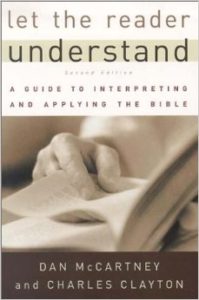Some reflections on a church that has recently embraced egalitarianism

Keeping the Porch Light on in a Dark World

“If truth exists outside of ourselves, we will not know it by pretending that we have no presuppositions, nor will we attain it by embracing all our presuppositions as unchangeable parts of ourselves; we will achieve it only if we submit ourselves, presuppositions and all, to the One who understands and interprets all things rightly.”
–Dan McCartney and Charles Clayton, Let the Reader Understand Wheaton: Victor Books, 1994, pp. 16-17.
Zechariah and Elizabeth were barren; Israel was barren. The childlessness of a godly couple in their old age is mirrored by the spiritual dryness of the of the people of God. Israel had not heard a prophetic voice for centuries. No man living could recall hearing a prophet. Zechariah, an Aaronic priest who is chosen by lot, burns incense at the hour of prayer. It is then he is met by Gabriel, who announces the birth of a son, who is to be named John. All of his and Elizabeth’s hopes and prayers were answered, although Zechariah cannot believe it. He is struck silent. The reproach upon Israel was soon to be lifted, just as the reproach of childlessness was from Elizabeth.
It may seem odd that Luke spends so much time on the birth story of the forerunner of Christ. It does not seem so odd, however, when the greater story is considered: a priest, of the tribe of Levi is burning incense in the temple, according to the Law, following the centuries-old ceremonies that demand repetition daily. During this temple ministry, a son is promised, but not one who will be a priest like his father. John will be a prophet, in the spirit of Elijah; the first prophet in centuries. Something new is coming.
Note also that John, of the tribe of Levi, will prepare the way for the final High Priest (Hebrews, chapters 5-8), the Saviour, the “Lamb of God who takes away the sins of the world.” (John 1:29). “He must increase, but I must decrease” (John 3:30). Levi gives way to Judah. Someone New has come.
In that same Holy Place in Herod’s great temple, Zechariah receives the first indications that the temple system is not eternal, but shall be declared irrelevant in the Kingdom of God. John will not carry on the temple traditions, but announce a new atoning sacrifice in Christ. Levi gives way to Judah.
In all of Christ’s ministry there is no miraculous sign or event in the temple, until the last day of the temple’s place in God’s economy: “ . . . And the curtain of the temple was torn in two” Luke 23:45. Jesus taught that the temple is to be destroyed. Because of the cross, its purpose is finally complete. It can now serve no other purpose. Limited access to God, restricted to the priesthood, is over. Access now is for “. . . as many as were appointed to eternal life . . . (Acts 13:48).
The ceremonial Law is now complete, and the old covenant is ratified.
In a ceremony in the Holy Place, the end of the Holy Place is foretold.